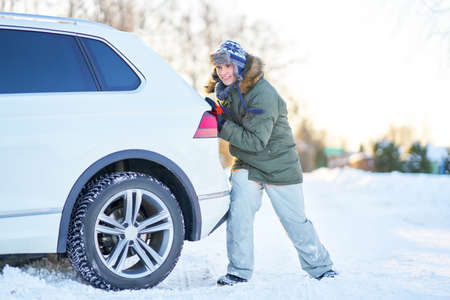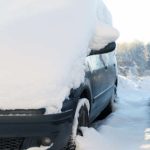1. Check and Maintain Your Car’s Battery
Extreme temperatures can weaken your battery. In winter, cold weather reduces battery capacity, and in summer, heat can cause corrosion. Test and replace the battery if needed.
How Winter Affects Your Battery
Cold temperatures slow down the chemical reactions inside your battery, making it harder for your car to start. If your battery is already weak, winter conditions can drain it completely.
How Summer Affects Your Battery
Hot weather accelerates battery fluid evaporation and increases corrosion, which can reduce battery life. High temperatures can also cause internal damage.
How to Check Your Battery
Regular battery checks can help prevent unexpected issues. Use a multimeter to check the voltage. A fully charged battery should read around 12.6 volts when the engine is off and about 13.7 to 14.7 volts when the engine is running.
| Battery Condition | Voltage Reading |
|---|---|
| Fully Charged | 12.6V or higher |
| Needs Charging | 12.4V to 12.5V |
| Weak Battery | Below 12.4V |
| Engine Running (Normal) | 13.7V to 14.7V |
Battery Maintenance Tips
- Keep battery terminals clean to prevent corrosion.
- Ensure the battery is securely mounted to avoid vibrations.
- Check battery fluid levels in non-sealed batteries and top off with distilled water if needed.
- Test your battery regularly, especially before extreme weather seasons.
- Replace the battery if it’s older than three to five years or shows signs of weakness.
2. Inspect and Maintain Tires
Tire pressure changes with temperature fluctuations. Whether its freezing cold or scorching hot, maintaining your tires is crucial for safety and performance. Here’s how you can keep them in top shape for both winter and summer conditions.
Winter Tire Care
Cold temperatures cause tire pressure to drop, which can affect traction and handling. Ensure your tires are properly inflated and have enough tread depth to handle icy or snowy roads.
Winter Tire Checklist
| Task | Why It’s Important |
|---|---|
| Use winter tires or high-quality all-season tires | Designed for better grip on snow and ice |
| Check tire pressure regularly | Cold weather reduces tire pressure, affecting control |
| Inspect tread depth | Deeper treads improve traction on slippery roads |
Summer Tire Care
Hot weather can lead to tire overheating and overinflation, which increases the risk of blowouts. Regular checks and proper inflation are key to safe summer driving.
Summer Tire Checklist
| Task | Why It’s Important |
|---|---|
| Check tire pressure frequently | Heat causes air expansion, which may lead to overinflation |
| Look for signs of overheating | Excess heat can damage tire rubber and shorten lifespan |
| Rotate tires regularly | Ensures even wear and extends tire life |
Taking care of your tires according to seasonal conditions helps maintain optimal performance and keeps you safe on the road, no matter the weather.

3. Ensure Proper Cooling and Heating Systems
Keeping your car’s heating and cooling systems in top shape is essential for handling extreme weather conditions. Whether youre facing freezing temperatures in winter or scorching heat in summer, a well-maintained HVAC system will keep you comfortable and help prevent mechanical issues.
Winter: Check the Heater and Defroster
When temperatures drop, a functioning heater and defroster are crucial for both comfort and safety. Here’s what to check:
| Component | What to Check |
|---|---|
| Heater | Ensure warm air blows consistently. If theres a lack of heat, it could indicate a thermostat issue or low coolant levels. |
| Defroster | Test the front and rear defrosters. If they don’t clear up fog or ice effectively, there could be a blower or ventilation problem. |
| Coolant Levels | Check coolant levels and top off if necessary. Low coolant can affect both heating and engine performance. |
Summer: Maintain Your Air Conditioning System
During hot months, a fully functional air conditioning system helps prevent overheating—both for you and your engine. Follow these steps:
| Component | What to Check |
|---|---|
| AC Performance | Turn on the AC and ensure it blows cold air consistently. If not, it may need a refrigerant recharge or further inspection. |
| Cooling Fans | Make sure the radiator and AC condenser fans work properly. Faulty fans can lead to overheating. |
| Cabin Air Filter | A dirty cabin air filter can restrict airflow. Replace it if it’s clogged to improve AC efficiency. |
Regular Maintenance Is Key
Checking your car’s cooling and heating systems before extreme weather sets in can save you from unexpected breakdowns. If you notice poor performance, strange noises, or weak airflow, have a professional inspect the system to avoid inconvenient or costly repairs.
4. Use the Right Fluids
Using the correct fluids for your car is crucial to keeping it running smoothly in extreme weather. The type of fluids you use can make a big difference in both winter and summer conditions.
Winter Fluid Recommendations
Cold temperatures can cause certain fluids to thicken or even freeze, which can lead to performance issues or damage to your car. To ensure proper function during winter, consider the following:
| Fluid | Recommendation |
|---|---|
| Windshield Washer Fluid | Use winter-grade fluid with antifreeze properties to prevent freezing. |
| Coolant | Ensure your coolant has the correct antifreeze mixture to prevent the engine from freezing. |
Summer Fluid Recommendations
Hot temperatures put extra strain on your cars engine and cooling system, making it essential to keep fluids at proper levels to avoid overheating.
| Fluid | Recommendation |
|---|---|
| Coolant | Check coolant levels regularly and use the right coolant-to-water ratio to prevent overheating. |
| Engine Oil | Ensure oil levels are sufficient and consider using high-temperature-resistant oil if needed. |
By using the appropriate fluids for each season, you can protect your vehicle from extreme temperatures and keep it running efficiently all year long.
5. Five. Prepare an Emergency Kit
Extreme weather conditions can create unexpected challenges on the road, so having an emergency kit in your car is essential. Whether youre facing freezing winter temperatures or scorching summer heat, being prepared can make a big difference. Here’s what you should keep in your car for different seasons:
Winter Emergency Kit Essentials
- Blankets and Warm Clothing: If you get stranded in freezing temperatures, staying warm is crucial.
- Ice Scraper and Snow Brush: Keep your windshield clear for better visibility.
- Sand or Cat Litter: Helps provide traction if your tires get stuck in snow or ice.
- Emergency Food and Water: Non-perishable snacks and bottled water can sustain you if youre stranded.
Summer Emergency Kit Essentials
- Extra Water: Staying hydrated in extreme heat is vital.
- Sun Protection: Include sunscreen, a hat, and sunglasses to protect against sun exposure.
- First Aid Kit: Useful for treating minor injuries or heat-related issues.
Comparison of Winter and Summer Emergency Kits
| Winter Essentials | Summer Essentials |
|---|---|
| Blankets and warm clothing | Extra water |
| Ice scraper and snow brush | Sun protection (sunscreen, hat, sunglasses) |
| Sand or cat litter for traction | First aid kit |
| Emergency food and water | Emergency food and water |
Having an emergency kit tailored to the season can help you stay safe and prepared in extreme weather conditions. Keep these essentials in your vehicle at all times to be ready for the unexpected.


